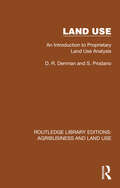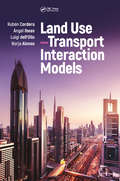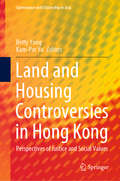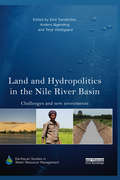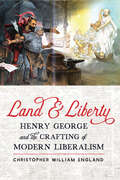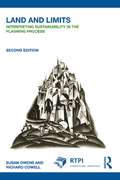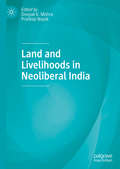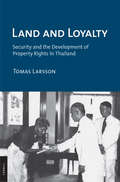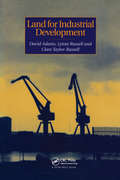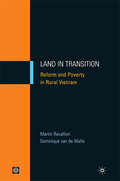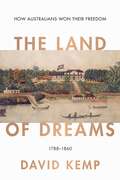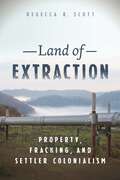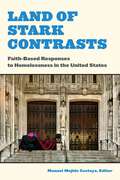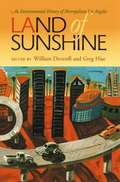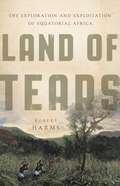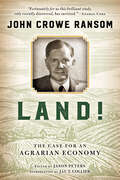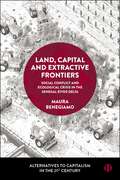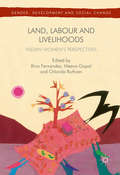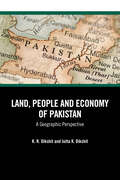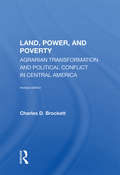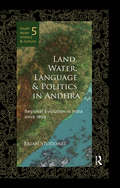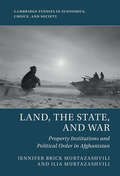- Table View
- List View
Land Use: An Introduction to Proprietary Land Use Analysis (Routledge Library Editions: Agribusiness and Land Use #2)
by D. R. Denman S. ProdanoOriginally published in 1972, this work shed new light on the study of land use. The key to the analysis was the proprietary land unit, within which all positive decisions touching land use are made. The analysis has a universal relevance, irrespective of social order, economic philosophy and judicial systems. The work will be of interest to lawyers, economists, agriculturalists, town and country planners and those in central and local government.
Land Use–Transport Interaction Models
by Rubén Cordera Ángel Ibeas Luigi dell’Olio Borja AlonsoTransport and the spatial location of population and activities have been important themes of study in engineering, social sciences and urban and regional planning for many decades. However, an integrated approach to the modelling of transport and land use has been rarely made, and common practice has been to model both phenomena independently. This book presents an introduction to the modelling of land use and transport interaction (LUTI), with a theoretical basis and a presentation of the broad state of the art. It also sets out the steps for building an operational LUTI model to provide a concrete application. The authors bring extensive experience in this cross-disciplinary field, primarily for an academic audience and for professionals seeking a thorough introduction.
Land and Housing Controversies in Hong Kong: Perspectives of Justice and Social Values (Governance and Citizenship in Asia)
by Betty Yung Kam-Por YuThis book discusses land and housing controversies in Hong Kong, which offer a point of reference for the comparison and analysis of similar or contrasting cases overseas from the perspective of social values. It enhances readers’ understanding of the social values, philosophical and theoretical issues that underpin land and housing controversies, as well as their policy implications. The discussion in each chapter goes beyond mere substantive and contextual analysis, and is explicitly positioned and theorized within the broader context of social values, with a theoretical and philosophical framework for assessing the issue concerned. The book is interdisciplinary in nature, with each chapter integrating two or more disciplines to examine various controversial land and housing issues.
Land and Hydropolitics in the Nile River Basin: Challenges and new investments (Earthscan Studies in Water Resource Management)
by Terje Oestigaard Emil Sandstrom Anders JagerskogThe Nile River Basin supports the livelihoods of millions of people in Egypt, Ethiopia, Sudan and Uganda, principally as water for agriculture and hydropower. The resource is the focus of much contested development, not only between upstream and downstream neighbours, but also from countries outside the region. This book investigates the water, land and energy nexus in the Nile Basin. It explains how the current surge in land and energy investments, both by foreign actors as well as domestic investors, affects already strained transboundary relations in the region and how investments are intertwined within wider contexts of Nile Basin history, politics and economy. Overall, the book presents a range of perspectives, drawing on political science, international relations theory, sociology, history and political ecology.
Land and Hydropolitics in the Nile River Basin: Challenges and new investments (Earthscan Studies in Water Resource Management)
by Terje Oestigaard Anders Jägerskog Emil SandströmThe Nile River Basin supports the livelihoods of millions of people in Egypt, Ethiopia, Sudan and Uganda, principally as water for agriculture and hydropower. The resource is the focus of much contested development, not only between upstream and downstream neighbours, but also from countries outside the region. This book investigates the water, land and energy nexus in the Nile Basin.It explains how the current surge in land and energy investments, both by foreign actors as well as domestic investors, affects already strained transboundary relations in the region and how investments are intertwined within wider contexts of Nile Basin history, politics and economy. Overall, the book presents a range of perspectives, drawing on political science, international relations theory, sociology, history and political ecology.
Land and Liberty: Henry George and the Crafting of Modern Liberalism (Hagley Library Studies in Business, Technology, and Politics)
by Christopher William EnglandA comprehensive history of Henry George and the single tax movement.In 1912, Sun Yat-sen announced the birth of the Chinese Republic and promised that it would be devoted to the economic welfare of all its people. In shaping his plans for wealth redistribution, he looked to an American now largely forgotten in the United States: Henry George. In Land and Liberty, Christopher William England excavates the lost history of one of America's most influential radicals and explains why so many activists were once inspired by his proposal to tax landed wealth. Drawing on the private papers of a network of devoted believers, Land and Liberty represents the first comprehensive account of this important movement to nationalize land and expropriate rent. Beginning with concerns about rising rents in the 1870s and ending with the establishment of New Deal policies that extended public control over land, natural resources, and housing, "Georgism" served as a catalyst for reforms intended to make the nation more democratic. Many of these concerns remain relevant today, including the exploitation of natural resources, rising urban rent, and wealth inequality. At a time when class divisions sparked fears that capitalism and democracy were incompatible, hopes of building a social welfare state using the rents of idle landlords revitalized the middle class's conviction that democracy and liberty could be reconciled. Against steep odds, George made land nationalization vital to the politics of a nation dominated by small farmers and helped push liberalism leftward through his calls for collective rights to land and natural resources.
Land and Limits: Interpreting Sustainability in the Planning Process (RTPI Library Series)
by Richard Cowell Susan OwensThe first edition of this seminal book was written at a time of rapidly growing interest in the potential for land use planning to deliver sustainable development, and explored the connections between the two and implications for public policy. In the decade since the book was first conceived, environmental imperatives have risen still further up the policial agenda and land use conflicts have intensified, lending even greater importance to the authors' research. In a rigorous discussion of concepts, policy instruments and contemporary planning dilemmas, the authors challenge prevailing assumptions about planning for sustainability. After charting the remarkable growth in expectations of planning, they show how attempts to interpret sustainability must lead to fundamental moral and political choices.
Land and Livelihoods in Neoliberal India
by Deepak K. Mishra Pradeep NayakThe book discusses important developments emerging around the land questions in India in the context of India’s neoliberal economic development and its changing political economy. It covers many issues that have been impinging the political economy in land and livelihoods in India since the 1990s, examining the land question from diverse methodological standpoints. Most of the chapters rely on evidence generated through primary surveys in different parts of the country. The book, via its diversity of approaches and methodologies, brings out new and hitherto unexplored and/or less researched issues on the emerging land question in India. The range of issues addressed in the volume encompasses the contemporary developments in the political economy of land, land dispossession, SEZs, agrarian changes, urbanisation and the drive for the commodification of land across India. The authors also examine role of the state in promoting the capitalist transformation in India and continuities and changes emerging in the context of land liberalisation and market-friendly economic reforms.
Land and Loyalty: Security and the Development of Property Rights in Thailand (Cornell Studies in Political Economy)
by Tomas LarssonDomestic and international development strategies often focus on private ownership as a crucial anchor for long-term investment; the security of property rights provides a foundation for capitalist expansion. In recent years, Thailand's policies have been hailed as a prime example of how granting formal land rights to poor farmers in low-income countries can result in economic benefits. But the country provides a puzzle: Thailand faced major security threats from colonial powers in the nineteenth century and from communism in the twentieth century, yet only in the latter case did the government respond with pro-development tactics.In Land and Loyalty, Tomas Larsson argues that institutional underdevelopment may prove, under certain circumstances, a strategic advantage rather than a weakness and that external threats play an important role in shaping the development of property regimes. Security concerns, he find, often guide economic policy. The domestic legacies, legal and socioeconomic, resulting from state responses to the outside world shape and limit the strategies available to politicians. While Larsson's extensive archival research findings are drawn from Thai sources, he situates the experiences of Thailand in comparative perspective by contrasting them with the trajectory of property rights in Japan, Burma, and the Philippines.
Land for Industrial Development
by D. Adams L. Russell C. Taylor-Russell Clare Taylor-RussellThis book provides a detailed account of the processes of land supply, land exchange and land development for manufacturing industry. It has a practical case-study based approach which provides an understanding of the motives and behaviour of critical factors in the development process.
Land in Transition
by Dominique van de Walle Martin RavallionThis book is a case study of Vietnam's efforts to fight poverty using market-oriented land reforms. In the 1980s and 1990s, the country undertook major institutional reforms, and an impressive reduction in poverty followed. But what role did the reforms play? Did the efficiency gains from reform come at a cost to equity? Were there both winners and losers? Was rising rural landlessness in the wake of reforms a sign of success or failure? 'Land in Transition' investigates the impacts on living standards of the two stages of land law reform: in 1988, when land was allocated to households administratively and output markets were liberalized; and in 1993, when official land titles were introduced and land transactions were permitted for the first time since communist rule began. To fully assess the poverty impacts of these changes, the authors' analysis of household surveys is guided by both economic theory and knowledge of the historical and social contexts. The book delineates lessons from Vietnam's experience and their implications for current policy debates in China and elsewhere.
Land of Dreams: How Australians Won Their Freedom, 1788-1860
by David KempThe Land of Dreams: How Australians Won Their Freedom, 1788-1860 tells the story of how Australians became a free people, gaining the liberties they desired to take control of their own lives, the right to govern themselves and the capacity to address their own political problems through democratic institutions. As the first book in a path-breaking five-volume Australian Liberalism series, it tells the story of how Australians laid the foundations for one of the world's most successful countries, with unprecedented levels of personal liberty and social equality. Australians did not have to fight a war for their independence, but neither did they gain it without a struggle against policies imposed by a British government in which they had no part. It required a brilliant political campaign that walked to the edge of violent resistance and from it Australia gained a national identity and political leaders who would write their constitutions, introduce democracy and later lead the successful political fight for one Australian nation.
Land of Extraction: Property, Fracking, and Settler Colonialism
by Rebecca R. Scott2024 Outstanding Academic Title, given by Choice ReviewsExplores fracking’s dual impact on settler colonial culture and sustainabilityThrough meticulous research and poignant storytelling, Land of Extraction unravels the complex web of relationships between humans, places, and the environment, all bound by the concept of private property. It presents a thought-provoking analysis of how settler colonial culture imposes limits on environmental politics.Drawing on real-life events, fictional portrayals of fossil-fuel driven apocalypses, and firsthand ethnographic accounts of the fracking and pipeline boom in West Virginia, Rebecca R. Scott argues that the American dream’s promise of empowerment through property ownership actually restricts action against extractive industries and hampers the progress of environmental justice coalitions.As the ever-expanding reach of natural gas and pipeline industries takes its toll on communities, the book reveals the fractures in landowners’ reliance on private property, opening the door to more sustainable futures. A powerful call to reevaluate our perspectives and challenge the status quo, this book will leave readers questioning the foundations of our society and the possibilities that lie ahead.
Land of Stark Contrasts: Faith-Based Responses to Homelessness in the United States
by Manuel Mejido CostoyaAn important new volume showcasing a wide range of faith-based responses to one of today’s most pressing social issues, challenging us to expand our ways of understanding. Land of Stark Contrasts brings together the work of social scientists, ethicists, and theologians exploring the profound role of religion in understanding and responding to homelessness and housing insecurity in all corners of the United States—from Seattle, San Francisco, and Silicon Valley to Dallas and San Antonio to Washington, D.C., and Boston.Together, the essays of Land of Stark Contrasts chart intriguing ways forward for future initiatives to address the root causes of homelessness. In this way they are essential reading for practical theologians, congregational leaders, and faith-based nonprofit organizers exploring how to combine spiritual and material care for homeless individuals and other vulnerable populations. Social workers, nonprofit managers, and policy specialists seeking to understand how to partner better with faith-based organizations will also find the chapters in this volume an invaluable resource.Contributors include James V. Spickard, Manuel Mejido Costoya and Margaret Breen, Michael R. Fisher Jr., Laura Stivers, Lauren Valk Lawson, Bruce Granville Miller, Nancy A. Khalil, John A. Coleman, S.J., Jeremy Phillip Brown, Paul Houston Blankenship, María Teresa Dávila, Roberto Mata, and Sathianathan Clarke.Co-published with Seattle University’s Center for Religious Wisdom and World Affairs
Land of Sunshine: An Environmental History of Metropolitan Los Angeles
by William Deverell Greg HiseMost people equate Los Angeles with smog, sprawl, forty suburbs in search of a city-the great "what-not-to-do" of twentieth-century city building. But there's much more to LA's story than this shallow stereotype. History shows that Los Angeles was intensely, ubiquitously planned. The consequences of that planning-the environmental history of urbanism--is one place to turn for the more complex lessons LA has to offer. Working forward from ancient times and ancient ecologies to the very recent past, Land of Sunshine is a fascinating exploration of the environmental history of greater Los Angeles. Rather than rehearsing a litany of errors or insults against nature, rather than decrying the lost opportunities of "roads not taken," these essays, by nineteen leading geologists, ecologists, and historians, instead consider the changing dynamics both of the city and of nature. In the nineteenth century, for example, "density" was considered an evil, and reformers struggled mightily to move the working poor out to areas where better sanitation and flowers and parks "made life seem worth the living. " We now call that vision "sprawl," and we struggle just as much to bring middle-class people back into the core of American cities. There's nothing natural, or inevitable, about such turns of events. It's only by paying very close attention to the ways metropolitan nature has been constructed and construed that meaningful lessons can be drawn. History matters. So here are the plants and animals of the Los Angeles basin, its rivers and watersheds. Here are the landscapes of fact and fantasy, the historical actors, events, and circumstances that have proved transformative over and over again. The result is a nuanced and rich portrait of Los Angeles that will serve planners, communities, and environmentalists as they look to the past for clues, if not blueprints, for enhancing the quality and viability of cities.
Land of Tears: The Exploration and Exploitation of Equatorial Africa
by Robert HarmsA prizewinning historian's epic account of the scramble to control equatorial Africa In just three decades at the end of the nineteenth century, the heart of Africa was utterly transformed. Virtually closed to outsiders for centuries, by the early 1900s the rainforest of the Congo River basin was one of the most brutally exploited places on earth. In Land of Tears, historian Robert Harms reconstructs the chaotic process by which this happened. Beginning in the 1870s, traders, explorers, and empire builders from Arabia, Europe, and America moved rapidly into the region, where they pioneered a deadly trade in ivory and rubber for Western markets and in enslaved labor for the Indian Ocean rim. Imperial conquest followed close behind. Ranging from remote African villages to European diplomatic meetings to Connecticut piano-key factories, Land of Tears reveals how equatorial Africa became fully, fatefully, and tragically enmeshed within our global world.
Land or Death: The Peasant Struggle in Peru
by Hugo Blanco"LAND OR DEATH," says Peter Camejo in his introduction, "constitutes one of the most significant contributions to the theory and practice of Latin American revolution since the Cuban Revolution." It not only describes the conditions of peasant life, but tells the fascinating story of thousands of Quechua Indians who began to take back the lands stolen from them. Drawing on his experience as a leading figure in this mass peasant movement, Blanco takes issue with those who believe the revolution in Latin America can come through either elections or small groups of dedicated, but isolated, guerrillas. Hugo Blanco, a principal organizer of the peasant movement in Peru, was sentenced to a twenty-five year prison term for his activities. Written from inside the famous El Fronton Island prison, Land or Death illustrates Blanco's refusal to be silenced by the government. Blanco was freed in 1970 under the pressure of an international campaign.
Land!: The Case for an Agrarian Economy
by John Crowe RansomFrom a National Book Award winner, &“an indictment of a system that values accumulation, shareholder profit . . . over . . . self-sufficiency, and solidarity.&” (Robert Neuwirth, author of Stealth of Nations: The Global Rise of the Informal Economy) John Crowe Ransom's Land! is a previously unpublished work that unites the accomplished literary scholar&’s poetic sensibilities with an examination of economics at the height of the Great Depression. Politically charged with Ransom's aesthetic beliefs about literature and his agrarian interpretation of economics, Land! was long thought to have been burned by its author after he failed to find a publisher. Thankfully, the manuscript was discovered, and we are now able to read this unique and interesting contribution to the Southern Agrarian revival. After the publication of the Agrarian movement manifesto I&’ll Take My Stand in 1930, Ransom, a contributor, became convinced that the book had not adequately proposed an economic alternative to Northern industrialism, which had fairly obliterated the Southern way of life. Land! was Ransom's attempt to fill this gap. In it he presents the weaknesses inherent in capitalism and proposes instead that agrarianism, which could flourish alongside capitalism, would relieve the problems of unemployment. America, Ransom claims, is unique in offering this opportunity because, unlike in European countries, land is plentiful. &“Ransom joins Lauck in championing the values fostered by rural and small-town America. Is this just wishful thinking? Perhaps, and yet don&’t we sometimes need to step back before we can leap forward?&” —The Washington Post &“Ransom&’s affection for traditional rural culture provides an enjoyable warm streak in the book.&” —Choice &“Mr. Ransom&’s highly original argument unfolds in beautifully written prose. . . . engaging and thought-provoking.&” —George Core, retired editor of The Sewanee Review
Land, Capital and Extractive Frontiers: Social Conflict and Ecological Crisis in the Senegal River Delta (Alternatives to Capitalism in the 21st Century)
by Maura BenegiamoThis book examines ‘land-grabbing’ - its colonial roots and the fraught relationship between capital and nature amidst the current global socio-ecological crisis. Through ethnographic and archival research, Maura Benegiamo investigates an Italian company’s acquisition of 20,000 hectares in Senegal’s River Delta for agrofuel production and delves into the struggles of pastoral communities affected by the project. Through this landmark case, the book shows how European energy and global food security policies are reshaping rural spaces, expanding agrarian extractivism in sub-Saharan Africa. By shedding light on how contemporary capital–nature relationships perpetuate socio-ecological crises and colonial models, the book highlights the enduring forms of opposition to these processes. At the heart of these struggles lies a crucial question: how can we understand today’s crises while reclaiming alternative ways of living, producing and inhabiting the land?
Land, Labour and Livelihoods: Indian Women's Perspectives (Gender, Development and Social Change)
by Orlanda Ruthven Bina Fernandez Meena GopalThis book brings together a unique collection of theoretical and empirical analyses of women’s access to land, labour and livelihoods in contemporary India. The authors recognize that gender relations must be viewed intersectionally, along with other social relationships such as caste, ethnicity, religion, sexuality and age, in order to inform an integrated analysis of women’s persistent disadvantage in India. The chapters examine a diverse range of rural and urban livelihoods within sectors such as tea plantations, nursing, hair salons, sex work and waste collection. Documenting the shifts in these sectors in the context of economic liberalization, the authors offer insights on the challenges of development interventions as women negotiate shifts in their livelihood options. Written to engage, the contributions to this book will be of interest both to the general reader and to academics and practitioners in development and gender/women’s studies.
Land, People and Economy of Pakistan: A Geographic Perspective
by K. R. Dikshit Jutta K. DikshitThe book unravels the complexity of Pakistan’s physical terrain, from the Arabian Sea coast to the Himalayan heights, focusing on its bio-climatic environment. While throwing light on the evolution of societal organisation and the nature and intensity of economic enterprises, it discusses the human response to the natural milieu and the way natural resources have been harnessed.This volume discusses the distribution of natural resources and deciphers the evolutionary development of manufacturing, transport and trade, the main non-agricultural enterprises, and looks at the potential for their growth. It provides an overview of the country`s economy and its fluctuations through different political regimes. It also investigates the country’s diverse social, linguistic, and ethnic composition. A habitat study, incorporating villages and towns and their numerical and spatial distribution and also the hierarchical organisation of rural society have received a special focus in the book.The book, with its qualitative and quantitative information, will be useful to students, teachers and researchers studying physical geology, climatology, hydrology, soil science, environmental studies, archaeology, sociology, economics, demography, area studies and regional development studies. It will also be an indispensable companion to professionals in floral-landscaping, habitat study, administrators, and policymakers.
Land, Power, And Poverty: Agrarian Transformation And Political Conflict In Central America (Thematic Studies In Latin America)
by Charles D. BrockettThis book, Land, Power, and Poverty, explores the development of the rigid and unequal structures of rural Central American society and the role in the conflicts of five governments of the region Guatemala, Costa Rica, Honduras, El Salvador, and Nicaragua.
Land, Stewardship, and Legitimacy
by Andrea OliveCanada and the United States are similar in terms of the species of wildlife that mingle freely across their shared border. Despite this similarity, however, there are significant differences between approaches to wildlife management in these two nations. In Land, Stewardship, and Legitimacy, Andrea Olive examines the divergent evolution of endangered species policy on either side of the 49th parallel.Examining local circumstances in areas as distant and diverse as southern Utah and the Canadian Arctic, Olive shows how public attitudes have shaped environmental policy in response to endangered species law, specifically the Species at Risk Act in Canada and the Endangered Species Act in the U.S. Richly researched and accessibly written, this is the first book to compare endangered species policy on both sides of the Canada-U.S. border. It will appeal to students and scholars of environmental policy, politics, and ethics, and anyone interested in current approaches to wildlife management.
Land, Water, Language and Politics in Andhra: Regional Evolution in India Since 1850 (South Asian History and Culture)
by Brian StoddartThis book explains how access to and use of land, water and language helped shape Andhra politics in India from 1850 down to the present day. After independence, the debate over land reform and policies on irrigation has shaped the fortunes of various governments, while the debate over the make-up of the language-based state has stimulated separatist movements like the one in support of Telangana. The book discusses how British innovations in irrigation in coastal Andhra in the mid-nineteenth century transformed the economy there from food crops to cash crops, and created new markets for local entrepreneurs. This stimulated increased education and social reform in the region, which in turn supported new politics in search of constitutional concessions. The drive for a Telugu language-based province then arose in concert, and those political resources were then used to determine local patterns down to independence. The 1930s ruse of the socialists, then the communist organisations, was an extension of land and water tax debates, which impacted the political nature of development — both before and after — independence. This is one of the first books on Andhra that recounts this story and is based on extensive archival research exploring the deep relationships between land, water, language and politics. It would be of primary interest to those studying modern nationalism in India, natural resource management, Indian politics and economic growth.
Land, the State, and War: Property Institutions and Political Order in Afghanistan (Cambridge Studies in Economics, Choice, and Society)
by Ilia Murtazashvili Jennifer Brick MurtazashviliAlthough today's richest countries tend to have long histories of secure private property rights, legal-titling projects do little to improve the economic and political well-being of those in the developing world. This book employs a historical narrative based on secondary literature, fieldwork across thirty villages, and a nationally representative survey to explore how private property institutions develop, how they are maintained, and their relationship to the state and state-building within the context of Afghanistan. In this predominantly rural society, citizens cannot rely on the state to enforce their claims to ownership. Instead, they rely on community-based land registration, which has a long and stable history and is often more effective at protecting private property rights than state registration. In addition to contributing significantly to the literature on Afghanistan, this book makes a valuable contribution to the literature on property rights and state governance from the new institutional economics perspective.
